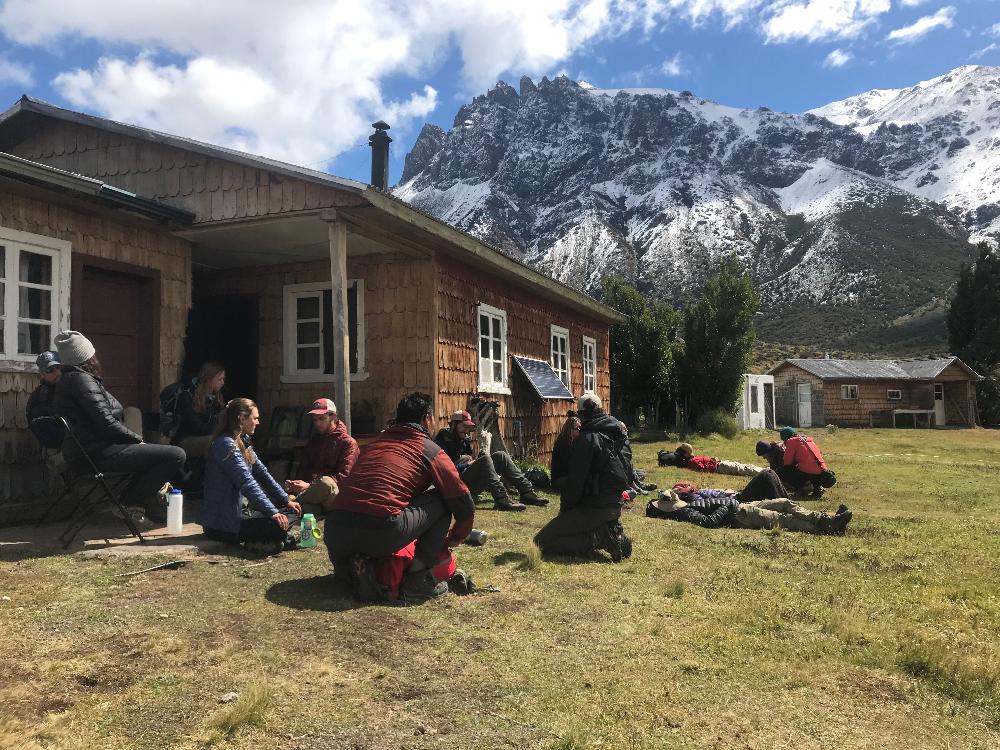
Patagonia is a dramatic landscape of ice fields, fjords, windswept grasslands, and glacial peaks rising from deep river valleys. Contribute to local conservation efforts by assisting our partners at Conservacion Patagonica and CONAF, a division of Chile’s Forest Corporation. Students spend the semester working in a variety of field sites: the grasslands of the Chacabuco Valley within Patagonia National Park, the misty, remote fjords of Bernardo O’Higgins National Park at the edge of the Southern Patagonia Ice Field, and the glaciers, lakes, and forests of the Los Glaciares region near Villa O’Higgins. Students operate out of three field bases near the remote villages of Cochrane, Tortel, and Puerto Eden. You will become familiar with wildlife monitoring techniques, focusing on iconic Chilean mammals such as guanaco and endangered huemul deer, and an array of bird species including the lesser rhea. You will also participate in Southern Ice Field community-based conservation and environmental education, an ongoing sustainable sphagnum moss harvest study, compilation of the first-ever plant field guide for Bernardo O’Higgins National Park, and biodiversity assessments in remote regions of Aysén. You will experience local Patagonian culture and enjoy ample opportunities to interact with guardaparques and gauchos. Weeklong homestays provide unique and special cultural experiences.
To read more about our Patagonia Program and the other programs we offer, click
here.

Patagonia is a wild ecological treasure, and the regions encompassing both the future Patagonia National Park and Bernardo O’Higgins National Park in southern Chile comprise a particularly significant and critical area.
The Chacabuco Valley, the heart of the future Patagonia National Park, is located in a transitional zone between the semi-arid Patagonian steppe and temperate beech forests, thereby boasting a wide range of habitats from grasslands to wetlands to high alpine peaks, and amazing scenery, including the world-renowned Baker River. Unique within Chile and Patagonia in terms of its diversity, this area supports a wide array of native wildlife and plant species. Among its more prominent residents are endangered huemul deer, guanaco, Andean condor, lesser or Darwin’s rhea, puma, armadillos and vizcacha (a threatened, alpine-dwelling large rodent).
In 2012, Round River began working with Conservación Patagónica (CP) in efforts to protect and restore biodiversity in Patagonia through the formation of National Parks. In 2004 the “future Patagonia National Park” project was initiated with the purchase of the 173,000-acre Estancia Valle Chacabuco (Chacabuco Valley Ranch). Since then, CP has focused on habitat restoration, baseline biodiversity inventories, and the development of infrastructure for future park visitors. In December 2014, Conservación Patagónica opened “Patagonia Park” to the public. They plan to hand over the park to Chilean government in 5-10 years, when it will open as “Patagonia National Park” and connect two existing reserves (Jeinimeni and Tamango).
Over the past two years, Round River instructors and students have assisted CP with biodiversity studies within the future national park, under the guidance of CP’s research staff. These studies have included vegetation sampling, bird surveys, and vizcacha surveys. Recent research has expanded to include monitoring guanaco populations within the park.
In 2014, while continuing to conduct fieldwork with CP in the Chacabuco Valley, Round River also began collaborating with CONAF, a division of Chile’s Ministry of Forests responsible for administering Chile’s National Parks. Working at the western edge of the Southern Patagonian Ice Field in Bernardo O’Higgins National Park, students spend time trekking through the forests and bogs of “the fjords,” a remote area of the park accessed only by boat. Here, among the Magellanic moorlands and rainforests, our students study the endangered huemul deer, birds, and plants. Fieldwork in Bernardo O’Higgins National Park is done with the guidance of CONAF’s “guardaparques” (park guards), providing students with an intimate cultural experience as well as a chance to learn more about the region from the people who know it best.
Round River’s research camp is located in the outskirts of the cozy town of Cochrane, and is well situated to support our ongoing work with CP and our new endeavors with CONAF. Our field house provides students with comfortable place to cook, gather for lectures and meals, store gear, and enjoy amenities such as hot showers and electricity. Students sleep in tents on a field above a bright blue river, and enjoy interacting with the local landowners.
Round River students can expect to spend most days hiking – from day trips into Valle Chacabuco to nine day bushwhacking adventures through the fjords of Bernardo O’Higgins National Park with a heavy pack. Students should be physically and mentally prepared for backpacking and hiking over rough terrain, along and through rivers, up and over mountains, and around alpine lakes in a never-ending quest to conduct research and observe the natural history of this incredible region. Students also have the opportunity to compare and contrast conservation strategies between the Chacabuco and the fjords – two completely different ecosystems and conservation models.
In addition to their fieldwork and academics, students will participate in experiential learning on the region’s ecological and cultural history with local researchers and residents.
Spanish language skills are strongly encouraged but not required; all lectures and field activities are conducted in English. Having even a basic understanding of Spanish will allow students to interact with the locals (including the CONAF guardaparques), thereby enabling a stronger cultural experience.
Eligibility Min GPA 2.75; 2-3 semesters of Spanish; Coursework in biology, basic math, statistics, genetics, and ecology
Type of Program Field-Based/Research Program
Areas of Study Environmental StudiesProgram LanguagesEnglish
Terms Offered Fall, Spring
Colby Status Approved Program
